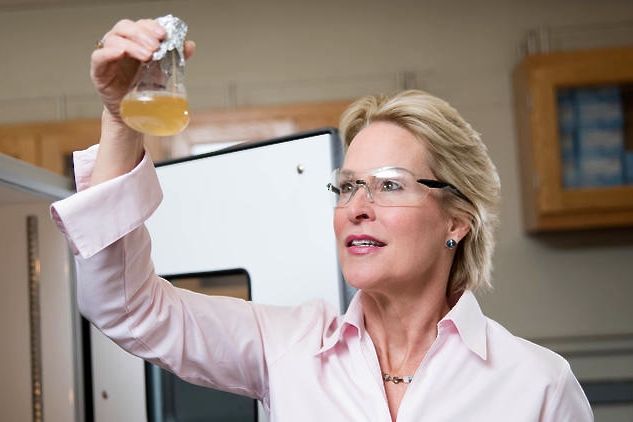Evolutionary Engineer Frances Arnold Wins € 1 Million Millennium Technology Prize

ICB Project Leader and Caltech Dickinson Professor of Chemical Engineering, Bioengineering and Biochemistry, Frances Arnold has been awarded the 2016 Millennium Technology Prize in recognition of her pioneering innovation, directed evolution, which mimics natural selection to create new and better proteins in the laboratory. This technology uses the power of biology and evolution to solve many important problems, often replacing less efficient and sometimes environmentally harmful technologies.
Directed evolution works by inducing mutations to the DNA, or gene, that encodes a particular enzyme. An array of thousands of mutated enzymes is produced, and then tested for a desired trait. The top-performing enzymes are selected and the process is repeated to further enhance the enzyme's performance. For instance, in 2009, Arnold and her team engineered enzymes that break down cellulose, the main component of plant-cell walls, creating better catalysts for turning agricultural wastes into fuels and chemicals.
"It's redesign by evolution. This method can be used to improve any enzyme, and make it do something new it doesn't do in nature. We can do what nature takes millions of years to do in a matter of weeks," says Arnold. "The most beautiful, complex, and functional objects on the planet have been made by evolution. We can now use evolution to make things that no human knows how to design. Evolution is the most powerful engineering method in the world, and we should make use of it to find new biological solutions to problems."
Today, directed evolution is at work in hundreds of laboratories and companies that make everything from laundry detergent to medicines, including a drug for treating type 2 diabetes. Enzymes created using the technique have replaced toxic chemicals in many industrial processes.
Arnold has been recognized throughout her career with numerous awards, including in 2011 both the Charles Stark Draper Prize—the engineering profession's highest honor—and the National Medal of Technology and Innovation. Arnold is one of a very small number of individuals to be elected to all three branches of the National Academies—The National Academy of Engineering (2000), the Institute of Medicine (2004), the National Academy of Sciences (2008) and the first woman elected to all three branches.
As the first woman to win the Millennium Technology Prize, Arnold says "I certainly hope that young women can see themselves in my position someday. I hope that my getting this prize will highlight the fact that yes, women can do this, they can do it well, and that they can make a contribution to the world and be recognized for it.”
The Millennium Technology Prize, worth one million euros (approximately $1.1 million), is awarded every two years by Technology Academy Finland (TAF) to "groundbreaking technological innovations that enhance the quality of people's lives in a sustainable manner," according to the prize website. The prize was first awarded in 2004. Past recipients include Sir Tim Berners-Lee, creator of the World Wide Web; Shuji Nakamura, the inventor of bright blue and white LEDs; and ethical stem cell pioneer Shinya Yamanaka.
Technology Academy Finland (TAF) announcement.
